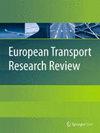洞察关键的城市行人动态:以小样本盲人行人和电动车为重点的观察研究
IF 4.2
3区 工程技术
Q1 TRANSPORTATION
引用次数: 0
摘要
无论是在现场还是通过模拟进行的观察研究,都是调查和理解行人行为以及验证已就同一主题开展的类似研究结果的实用选择。虽然在人口特征和个人背景方面存在困难,但观察代表了对实际行为的采用,突出了城市地区环境和基础设施的不同场景、背景和特征。然而,在欧洲,随着模拟器、调查和数据保护问题的增多,实地观察已较少被考虑,一些研究也被搁置。本研究以观察为基础,利用葡萄牙科英布拉六个行人过马路的数据,回答了行为和人口统计问题,即年龄和性别。这次经历发生在一周中的不同日子(封锁前一周),记录了盲人(和非盲人)在 6 个人行横道上面对电动车的行为,每个人行横道 30 分钟,上午或下午,在高峰时段以外的有利天气条件下,总共拍摄和评估了 180 (30*6) 分钟。此外,还对决策和过街行为中的责任(一名行人在另一名行人的引导下)与集体行动之间的关系进行了调查。研究的另一个相关方面是行人与电动车在不同情况下的关系。研究期间,在观察体验中插入了一辆电动车,在街道上循环行驶,观察行人对无噪音的反应。在这种情况下,盲人行人被邀请在这些区域过马路,并识别电动车的存在,以确定盲人行人和非盲人行人在行为上的一些差异。结果表明,盲人行人往往比非盲人行人更加谨慎,与其他道路使用者相比,年轻和年长的行人往往有更危险和更不谨慎的行为,而且年龄上的差异比性别上的差异更加明显。值得注意的是,在群体中,尤其是青少年,他们会犯更多的交通错误。此外,由于电动车没有噪音,在行人分心的情况下,如果驾驶员注意力不集中,发生事故的风险就会增加。本文章由计算机程序翻译,如有差异,请以英文原文为准。
Insights into critical urban pedestrian dynamics: an observational study spotlighting a small sample of blind pedestrians and electric vehicles
Observational studies, whether conducted on-site or through simulation, are practical options for investigating and comprehending pedestrian behaviour and validating the findings of similar studies that have already taken place on the same subject. Although they present difficulties in demographic characterisation and personal context, observation represents the adoption of actual behaviour, highlighting the different scenarios, contexts and characteristics of the environment and infrastructure in urban areas. However, with the growth in simulators, surveys, and data protection issues in Europe, field observation is less considered, and several studies have been left aside. Based on observation, this study answers behavioural and demographic questions, namely age and gender, using the data of six pedestrian crossings in Coimbra, Portugal. This experience occurred on different days of the week (the week before lockdown), registering blind (and non-blind) pedestrians' behaviour facing the electric vehicle in 6 crosswalks, 30 min in each crosswalk, morning or afternoon, with favourable weather conditions outside peak hours In total 180 (30*6) minutes were filmed and evaluated. The relationships between responsibility (when one pedestrian is guided by another) and group action in decision-making and crossing behaviour were also investigated. Another relevant aspect studied was the relationship between pedestrians and electric vehicles in different contexts. During the research, an electric vehicle was inserted in the observational experience, circulating in the streets to observe the pedestrians' reaction to the absence of noise. In this context, blind pedestrians were invited to perform crossings in these areas and identify the presence of the electric vehicle, to identify some differences in the behaviour of blind pedestrians and non-blind pedestrians. The results indicate that blind pedestrians tend to be more cautious than non-blind pedestrians, that younger and elderly pedestrians tend to have more dangerous and less calculated behaviours than other road users and that the differences are more perceptible in age than gender. It should be noted that when in a group, especially adolescents, they commit more traffic errors. Furthermore, regarding the absence of noise associated with the electric vehicle, in moments of pedestrian distraction, if the driver is not attentive, there is an increase in the risk of accidents.
求助全文
通过发布文献求助,成功后即可免费获取论文全文。
去求助
来源期刊

European Transport Research Review
Engineering-Mechanical Engineering
CiteScore
8.60
自引率
4.70%
发文量
49
审稿时长
13 weeks
期刊介绍:
European Transport Research Review (ETRR) is a peer-reviewed open access journal publishing original high-quality scholarly research and developments in areas related to transportation science, technologies, policy and practice. Established in 2008 by the European Conference of Transport Research Institutes (ECTRI), the Journal provides researchers and practitioners around the world with an authoritative forum for the dissemination and critical discussion of new ideas and methodologies that originate in, or are of special interest to, the European transport research community. The journal is unique in its field, as it covers all modes of transport and addresses both the engineering and the social science perspective, offering a truly multidisciplinary platform for researchers, practitioners, engineers and policymakers. ETRR is aimed at a readership including researchers, practitioners in the design and operation of transportation systems, and policymakers at the international, national, regional and local levels.
 求助内容:
求助内容: 应助结果提醒方式:
应助结果提醒方式:


